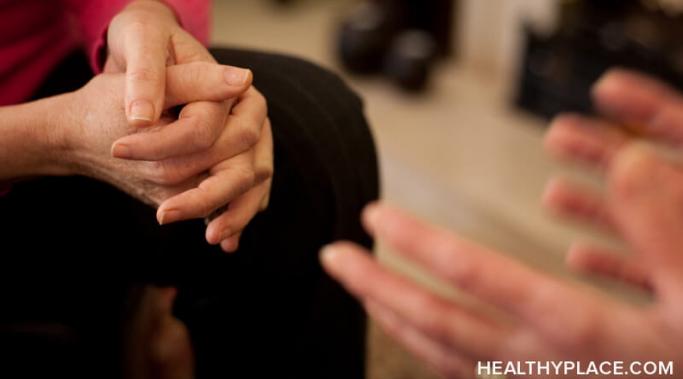Blogs
I wasn't actually diagnosed with posttraumatic stress disorder (PTSD) when I started therapy. So years into my first therapeutic relationship I realized we were going nowhere -- fast. I'd gotten into therapy to learn how to live as a chronic patient, but what we were doing was talking and talking and talking about my trauma and the enormous fears I carried. I was mentally and physically deteriorating at a frightening speed. I needed to know how to find a good PTSD therapist.
If anxiety were a person, it would likely have narcissistic personality disorder. Anxiety shares many traits with narcissism, making it a card-carrying narcissist. To be sure, both anxiety and a narcissist are difficult to deal with, but they have other characteristics in common as well. Knowing what they are and how to deal with them can help tame narcissistic anxiety.
No one likes to be rejected. Unfortunately, lesbian, gay, bisexual, transgender and questioning (LGBTQ) people experience a lot of rejection and oppression that lead to depression and other mental illnesses. As a pansexual, I have experienced my fair share of biphobia and homophobia in the past. While it certainly isn’t easy or fun to talk about, raising awareness is the only way of abolishing discrimination towards the LGBTQ community and reduce the rejection queer people face and their depressions.
We live in a world easily saturated by the news cycle. Whether through television, radio, the printed word, or the Internet, information on current events is continually available. But being constantly connected to the news can take a toll on our mental health and depression can trigger depression.
Many people have a difficult time in finding an effective mental health counselor. The key is to find someone that will help you solve your current mental health problems.
It seems like every time anxiety strikes in the presence of others, helpful folks offer the same advice. Take a walk, get some fresh air, or count to 10 are quickly raised as solutions, with the person offering the advice thinking this is the first time we've ever heard that suggestion. Speaking from my own experience, I do the same things over and over. If your methods to relieve anxiety aren't boring you and are working, then there is no need to switch it up. But if you are looking for other ways to relieve anxiety, I offer five ways to relieve anxiety you've (probably) never thought of.
Sometimes “crying out” the pain of an emotional situation works. I just did it with a friend. She, lovingly, sat across from me as I cried about a situation that I find hard. And it worked. I did, actually, feel better after crying out my emotions. But once, a therapist told me to “cry out” my bipolar depression. Instead of fighting the depression and pushing away the feelings, he told me my bipolar depression should be cried out.
Putting yourself down can be damaging to your self-esteem and self-confidence. That includes the words you say out loud in addition to your internal negative self-talk. Negative thoughts and words can be very believable and they distort your perception about yourself. They impact on your sense of self-worth. When you talk negatively about yourself to others, the words have a greater effect. You’re also making it easier for others to put you down. The good news is that you can stop putting yourself down and build your self-esteem.
I have come to realize how important it is to specifically schedule time to focus on you. When you struggle with self-harm or a mental illness, those battles begin to take over your life. You cannot focus on hobbies and passions with as much ease because those busy, irritating thoughts are clouding your mind. The more you give in to the self-injury urges that surround you, the more time you give up that could have been benefiting your wellness and health. What you might want to focus on is more time for you and less time for self-harm.
Spirituality can be vital to recovery from mental illness. But, like many things, spirituality and mental illness is a double-edged sword. While belief in a Higher Power can aid mental illness recovery, unhealthy spiritual beliefs can make our mental illness symptoms worse. But what are some warning signs of unhealthy spirituality? How do we know if we have what one writer called "toxic faith?"










I believe she will only be able to rid herself of her demons, and hopefully her BPD as well, when she's ready to confront the abuse of her father. If she can put the blame where it belongs, she may stop projecting that victim/perpetrator cycle on the present men in her life. These demons are a metaphor for the purgatory she has created for herself. That reality has consequences in the real world, but it need not be real in the tangible sense. Exorcising her demons will require the expenditure of real physical energy and probably the destruction of aspects of her personality. If this ever happens, and it's possible but not probable, then these demons will evaporate. They are only as real as one's personality is real. In short, reality is not the question, it's what you make of the things you feel to be real.